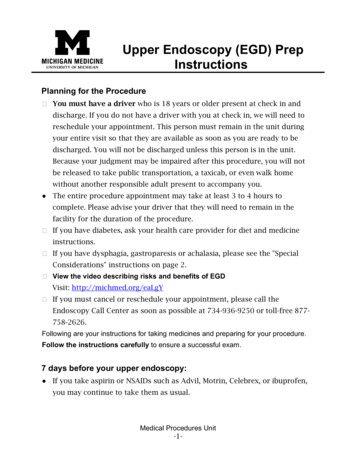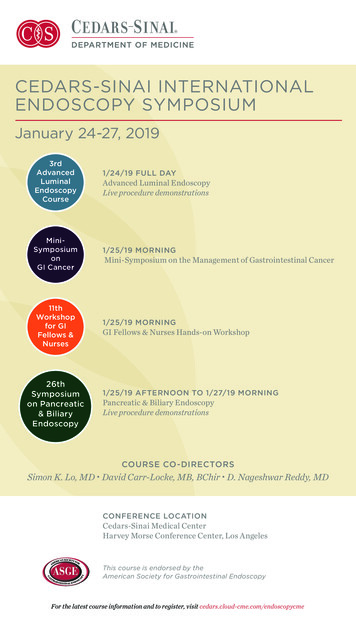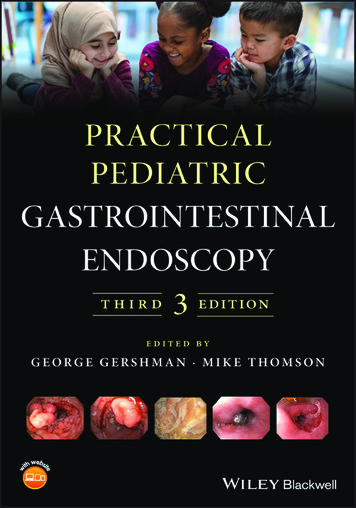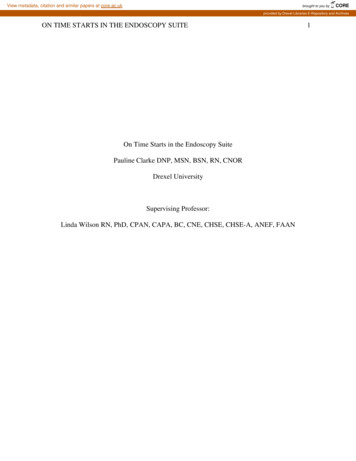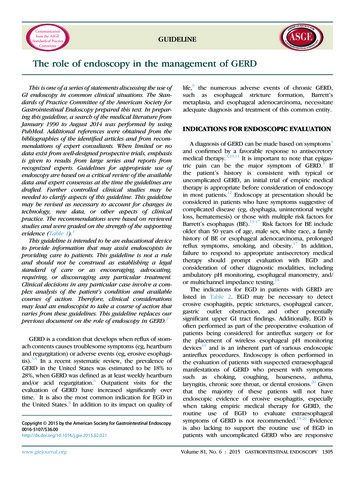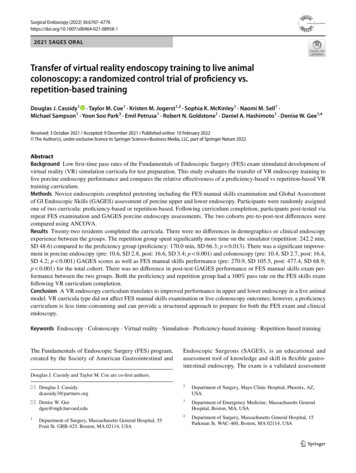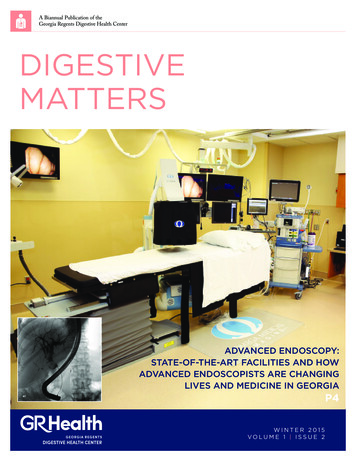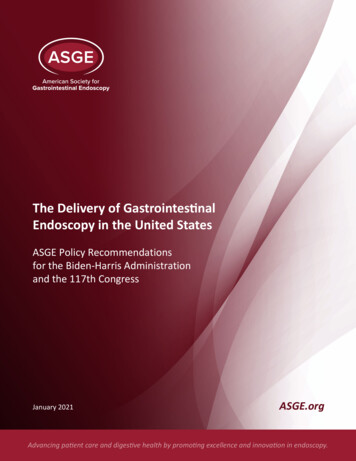
Transcription
The Delivery of GastrointestinalEndoscopy in the United StatesASGE Policy Recommendationsfor the Biden-Harris Administrationand the 117th CongressJanuary 2021ASGE.orgAdvancing patient care and digestive health by promoting excellence and innovation in endoscopy.
Policy Priorities and Recommendations2020-2021 ASGE GOVERNING BOARDPresidentKLAUS MERGENER, MD, PhD, MBA, FASGEUniversity of Washington – SeattleChair of the ASGE FoundationJOHN L. PETRINI, MD, MASGESanta Barbara, CaliforniaPresident-electDOUGLAS K. REX, MD, MASGEIndiana University Medical Center – IndianapolisGastrointestinal Endoscopy – EditorMICHAEL B. WALLACE, MD, MPH, FASGEJacksonville, FloridaSecretaryBRET T. PETERSEN, MD, MASGEMayo Clinic – RochesterChief Executive OfficerDONALD PALMISANO, JR., JD, CAEDowners Grove, IllinoisTreasurerPRATEEK SHARMA, MD, FASGEUniversity of Kansas – Kansas CityHealth and Public Policy Committe ChairBRUCE HENNESSY, MD, FASGEOhio Gastroenterology, IncColumbus, OhioSecretary-electAMITABH CHAK, MD, FASGEUniversity Hospitals Cleveland Medical Center – ClevelandPast PresidentsSTEVEN A. EDMUNDOWICZ, MD, MASGEAurora, ColoradoJOHN J. VARGO II, MD, MPH, MASGECleveland, OhioCouncilorsTODD H. BARON, SR., MD, FASGEChapel Hill, North CarolinaJENNIFER A. CHRISTIE, MD, FASGEAtlanta, GeorgiaJONATHAN COHEN, MD, FASGENew York, New YorkASHLEY L. FAULX, MD, FASGECleveland, OhioANNE MARIE LENNON, MD, PhD, FASGEBaltimore, MarylandWALTER G. PARK, MD, FASGEStanford, CaliforniaFor More Information ContactLAKITIA MAYOChief Policy and Member Engagement Officerlmayo@asge.orgCAMILLE BONTA, MHSWashington Representativecbonta@summithealthconsulting.com2
Policy Priorities and RecommendationsINTRODUCTIONThe American Society for Gastrointestinal Endoscopy (ASGE) was founded in 1941 and is dedicated toadvancing patient care and digestive health by promoting excellence in gastrointestinal endoscopy.With a member of more than 14,000 physicians worldwide, ASGE promotes the highest standards forendoscopic training and practice, develops clinical and quality guidelines and standards for infection control,fosters endoscopic research, recognizes distinguished contributions to endoscopy, and is the foremostresource for endoscopic education.Gastroenterologists care for patients with some of the most common, costly and consequential diseasesfacing the American public and the world today. Roughly 60 to 70 million people in the United States areaffected by digestive diseases.1 A 2008 report from the National Institute of Diabetes and Digestive andKidney Diseases (NIDDK) looked at the burden of digestive diseases in the United States.2 In 2004, the totaldirect cost of digestive diseases was estimated to be 97.8 billion.Endoscopy procedures, performed by ASGE members, play a significant role in the prevention, diagnosisand management of digestive diseases, including many of the deadliest, or recalcitrant, cancers includingcolorectal, pancreatic, liver, gastric and esophageal cancers.ASGE members provide endoscopic procedures predominantly in ambulatory endoscopy centersand ambulatory surgery centers (ASCs). ASGE members also deliver hospital inpatient and outpatientprocedure-based care, and provide office-based care and services, such as infusions for the treatment ofintestinal inflammatory disease.Issues confronting ASGE members and their patients are wide-ranging, many of which are not specific togastroenterology. ASGE, however, is the foremost society in endoscopic care and is eager to work with theBiden Administration and Congress to advance policies and initiatives that address critical issues of healthinequity and cancer prevention and early diagnosis, and to offer unique perspectives on payment andcoverage policies, regulatory requirements and patient access to gastrointestinal care.1D igestive Diseases Statistics for the United States. National Institute of Diabetes and Digestive and Kidney Diseases. h-statistics/digestive-diseases Accessed Jan. 4, 2021.2E verhart JE, editor. The burden of digestive diseases in the United States. US Department of Health and Human Services, Public Health Service, NationalInstitutes of Health, National Institute of Diabetes and Digestive and Kidney Diseases. Washington, DC: US Government Printing Office, 2008; NIH Publication No. 09-6443 -states3
Policy Priorities and RecommendationsAdvancing Public Health and GI Health EquityASGE is a leader in promoting policies, including patient cost-sharing policies, that improve access to andage-appropriate coverage of preventive colorectal cancer screening colonoscopy, especially in historicallyunder-screened populations. ASGE applauded Congress for taking action at the end of the 116th Congressto correct a long-standing oversight in the Affordable Care Act that wrongly held Medicare beneficiariesaccountable for out-of-pocket costs when potentially pre-cancerous polyps were removed during theirpreventive screening colonoscopy. Over eight years, this cost-sharing obligation will be phased-out,removing a financial barrier to life-saving screening colonoscopy.Despite improved uptake of screening colonoscopy, which is credited for the accelerated decline incolorectal cancer incidence and mortality since 2000, one-third of eligible adults are still not up to datewith colorectal cancer screening, and disparities of colorectal cancer among racial and ethnic populationsare striking.3 Incidence and mortality of colorectal cancer in blacks are 20 and 40 percent higher,respectively, than those in non-Hispanic whites.4 The racial gap among blacks, as well as other racial andethnic populations, likely reflects differences in uptake and quality of colorectal cancer screening tests andprevalence of colorectal cancer risk factors.Also of concern is the increase of colorectal cancer incidence in adults under age 50,5 which has prompteda draft recommendation from the U.S. Preventive Services Task Force (USPSTF) to lower the recommendedscreening age to 45.6 Should the USPSTF finalize its recommendation to assign a “B” rating for colorectalcancer screening in adults ages 45 to 49 years, health plans and issuers will be required to waive allassociated cost-sharing, consistent with the Section 2713 of the Public Health Act. Section 2713 requiresnon-grandfathered group health plans and health insurance coverage offered in the individual or groupmarket to provide benefits for and prohibit the imposition of cost-sharing requirements with respect toitems or services that have a rating of “A” or “B” in the current USPSTF recommendations.7 ecommendation: Increase funding to at least 70 million for the Centers for Disease Control andRPrevention’s Colorectal Cancer Control Program to ensure patients, particularly underrepresentedpopulations and those living in medically underserved communities, receive recommendedcolorectal cancer screening, follow-up, and treatment.3A merican Cancer Society. Colorectal Cancer Facts & Figures 2020-2022. Atlanta: American Cancer Society; 2020. ures-2020-2022.pdf4 Ibid.5 Screening for Colorectal Cancer: An Evidence Update for the U.S. Preventive Services Task Force. Agency for Healthcare Research and Quality; AHRQPublication No. 20-05271-EF-1 October 2020. reening3#bootstrap-panel--56 Draft Recommendation Statement: Colorectal Cancer: Screening; October 27, 2020. reening3#bootstrap-panel--5 Accessed Jan. 6, 2021.7 42 USC 300gg-13: Coverage of preventive health services. https://uscode.house.gov/view.xhtml?req (title:42%20section:300gg-13%20edition:prelim)4
Policy Priorities and RecommendationsHarnessing the Value of Ambulatory Endoscopy CentersThe Ambulatory Surgery Center (ASC is an important part of the practice of gastroenterology, providinga safe and cost-effective environment for the provision of medical services. The majority of ASCs in whichgastroenterologists practice are single specialty endoscopy centers.Exit and entry of ASCs in the market are driven in large part by Medicare payment policies. Today, ASCs arepaid roughly 52 percent of what the same care costs Medicare in a hospital outpatient department.The Centers for Medicare and Medicaid (CMS made the important change in 2019 to use the hospitalmarket basket, rather than CPI-U, to update annually ASC payments through CY 2023. Using the hospitalmarket basket ensures ASC payments are predictable and reflective of costs that are relevant to the deliveryof health care. Still, ASC payments, when compared to payments made to hospital outpatient departments,are less equitable than they should be.Medicare is roughly 20 percent of ASC revenues, and, according to the Medicare Payment AdvisoryCommission, growth of ASC-eligible procedures provided to Medicare fee-for-service beneficiaries has beenfaster in hospital outpatient departments than in ASCs.8 These data point to the economic disincentivesthat currently exist for ASCs to provide certain covered ASC services. Medicare payment policies thatdisincentivize the delivery of services in the ASC setting deny beneficiaries opportunities for lower out-ofpocket costs and limit the savings that could otherwise be realized by Medicare.The cost of the tools and equipment (such as hemostatic clips, EUS needles and endoscopic guidewiresnecessary for a variety of endoscopy procedures exceed current ASC Medicare payments, making those serviceseconomically infeasible to provide in the ASC. Because hospital outpatient payments are higher than those paidto ASCs, the cost of expensive medical equipment is captured in hospital payments. ASCs do not have the samepurchasing leverage as hospitals to drive down the cost of these necessary endoscopic tools, and the cost ofthese devices and other tools is rising as manufacturers move increasingly toward disposable equipment. Recommendation: Current Medicare payment policies are inhibiting the types of procedures that canbe safely provided in the ASC at a significant savings to the health care system. CMS should work withASC and physician stakeholders to ensure reimbursement adequacy for endoscopic services providedin the ASC, including allowing payment of certain endoscopic equipment on a per item basis.Recommendation: The divergence between ASC and hospital outpatient payments continues. CMS’alignment of the hospital outpatient and ASC update factors makes it easier to see the true effect of theASC weight scalar — an additional scaling factor that CMS applies to maintain budget neutrality withinthe ASC payment system. This means increases in ASC volume, including any shift of services from thehospital to the ASC, lead to payment stagnation or a decrease in reimbursement rates. Instead of budgetneutrality in silos, CMS should look at hospital outpatient departments and ASCs collectively.8 edicare Payment Advisory Commission Public Meeting Transcript. Thursday, December 3, 2020. Pg. 68 -materials/dec2020 public meeting transcript sec.pdf?sfvrsn 05
Policy Priorities and RecommendationsSupporting Medicare Physician Payment AdequacyMedicare Physician Fee ScheduleEnsuring patients with diseases of the digestive system have timely access to care requires paymentpolicies that accurately reflect the cost of care. Value-based payment models, when developed with inputfrom the physician community, offer opportunity to reward physicians for high-quality and cost-effectivecare. The reality is, however, that independent physician practices struggle with payment uncertainty andadministrative burden, and when coupled with an aging physician workforce, the escape hatch is practiceacquisition and consolidation.Medicare physician payments have not kept pace with inflation and the zero-sum structure of the Medicarephysician fee schedule means the Centers for Medicare and Medicaid Services (CMS) can’t improvepayment in any area of the fee schedule without cutting it somewhere else. A shortcoming of the feeschedule system was laid bare in 2020 when CMS finalized a more than 10 percent cut to the Medicareconversion factor to maintain budget neutrality while increasing payments for evaluation and managementservices. ASGE is grateful Congress intervened by passing a suite of provisions to blunt the effect of this cutin the midst of the COVID-19 pandemic. This rescue of physicians from drastic payment reductions gives riseto the need for a thoughtful discussion about ensuring fee schedule payment adequacy and predictability,while also encouraging value-based payment and care delivery.Payment predictability and adequacy also extend to office-administered Part B drugs. Biologics are theprimary treatment for certain disorders of the bowel. These biologics are oftentimes administered in thephysician’s office and reimbursed under Part B. ASGE is concerned the Most Favored Nation (MFN) Model,as presented in the interim final rule (85 Fed. Reg. 76180), will create situations where physicians are unableto acquire MFN model drugs at prices commensurate with MFN model reimbursement, which could make itimpossible for physicians to continue providing certain drugs as treatment options. Alternative drug pricingreform proposals must not impede patient access to essential therapies, and, at the same time, shouldensure physicians are adequately reimbursed for providing these treatments. ecommendation: As a result of physician practice financial instability due to the pandemic,RMedicare payment sequestration should be suspended beyond the March 31, 2021 statutorysuspension and through at least 2021.6
Policy Priorities and RecommendationsPrior AuthorizationMedicare Advantage and other private insurance plans routinely subject complex drugs, including biologics,to cumbersome authorization processes that lead to substantial delays in treatment. Gastroenterologists,who are not given rules or indications of how these authorizations will be adjudicated, often have toutilize specialty pharmacies or authorization specialists to navigate the authorization requirements andmust frequently prove a patient failed other therapies, including sometimes one or more drugs in thesame category, before the requested therapy will be approved. Prior authorization and step therapyprotocols unnecessarily delay patient care and shift costs onto providers who are uncompensated forthe administrative time and staff required for authorization and appeals when coverage of a prescribedtreatment is denied. Recommendation: Consistent with bipartisan legislation — the Improving Seniors’ TimelyAccess to Care Act of 2019 (H.R. 3107) — introduced in the House during the 116th Congress,the prior authorization processes used by Medicare Advantage plans should be streamlined andstandardized. ecommendation: When denial of prescribed treatment or step therapy requirements lead to aRdelay of appropriate medical care, insurers should be required to compensate physicians for thetime associated with seeking appropriate authorizations. Prior authorization and step-therapyrequirements are one-sided with no disincentive for plans to deny or delay care. MedicareAdvantage plans must accept some level accountability if appropriate treatment is withheld ordelayed.7
Policy Priorities and RecommendationsTelehealthThe COVID-19 pandemic has accelerated advancements in the use of telehealth for care delivery, pavingthe way for it as an essential part of patient care after the COVID era, including using telehealth to addressdisparities in access to care and outcomes. Telehealth services that have been added on an interim basisand policy changes that have been made to facilitate telehealth use during the COVID-19 public healthemergency should be made permanent at the end of the pandemic.Recommendations: Continue to support clinically appropriate care via telehealth by qualified health careprofessionals in the future, for both initial and established patient visits. Establish reimbursement for virtual and audio-only consultations at parity with in-person visits, inrecognition of the expense, expertise, and effort required in providing telehealth services. Preserve a health care provider’s ability to determine if a clinical situation is appropriate fortelehealth. Improve access to telehealth for patients across diverse settings and geographic areas,including by addressing disparities that may limit the ability to access or utilize telehealth. Tothe extent infrastructure or patient ability to utilize simple smart-phone audio-visual links arenot feasible, this includes recognition of telephone-only (audio-only) services as equivalent tovideo visits. Expand the use of telehealth to facilitate improved communication and clinical care in areasoutside of direct outpatient care, such as provider-to-provider communication, coordination ofpatient care, and virtual consults. Allow physicians and patients the flexibility to choose among easily accessed nonpublic-facingcommunications platforms, recognizing they may not necessarily be HIPAA compliant, untiltelehealth platforms can meet HIPAA protections. Provide liberalization for health care professionals to perform telehealth services across statelines, as long as physicians meet specific licensure requirements and conditions.8
2021-2022 ASGE Advocacy AgendaSupport Medicare Payment Adequacy: Ensure Medicare beneficiary access to GI care by advocating forMedicare physician payment adequacy, including for the delivery of telehealth services, and reimbursementthat reflects appropriate valuation of specialty and gastrointestinal endoscopic care.Promote the Value of GI Care Provided in Ambulatory Surgery Centers: Align payment and regulatorypolicies that encourage and facilitate the cost-effective delivery of endoscopic services in ambulatorysurgery centers.Advance Public Health and GI Health Equity: Promote policies, including patient cost-sharing policies, thatimprove access to and age-appropriate coverage of preventive colorectal cancer screening colonoscopy,especially in historically under-screened populations. Advocate for policies to increase awareness of thevalue of preventive health care services and improve equality in health care access, quality and outcomes,including through cultural competency training and by addressing racism and social determinants of health.Alleviate Administration Burden: Improve patient access to timely care by easing regulatory burdens andadministrative requirements imposed by Medicare and other payers that interfere with physician decisionmaking and the practice of gastrointestinal endoscopy, including utilization control mechanisms such asprior authorization and step-therapy.Promote Value-based Care: Support the delivery of high-quality care through policies that fostermeaningful physician participation in value-based care models, including through the use of meaningfulmeasures and availability of physician-led alternative payment models. Advocate for rules and regulationsthat support value-based GI care and care coordination, including through changes to physician self-referraland Stark Law restrictions.Support Pandemic Relief: Support for as long as necessary the continuation of regulatory and paymentpolicy flexibilities afforded to physicians during the COVID-19 Public Health Emergency and for financialsupport to offset the costs of the pandemic, including the cost of personal protective equipment andreduced patient capacity.Avoid Practice Restrictions: Support policies, including reimbursement rates, that support the delivery ofdiagnostic and therapeutic services, including office-based imaging, pathology, and anesthesia servicesregardless of physician ownership or site of service.Support Medical Research Funding: Increase funding for digestive disease, health equity, and costeffectiveness research including through the National Institutes of Health.9
Chief Executive Officer DONALD PALMISANO, JR., JD, CAE Downers Grove, Illinois . direct cost of digestive diseases was estimated to be 97.8 billion. Endoscopy procedures, performed by ASGE members, play a significant role in the prevention, diagnosis . 7 42 USC 300gg-13: Coverage of preventive health services. https://uscode.house.gov/view .


